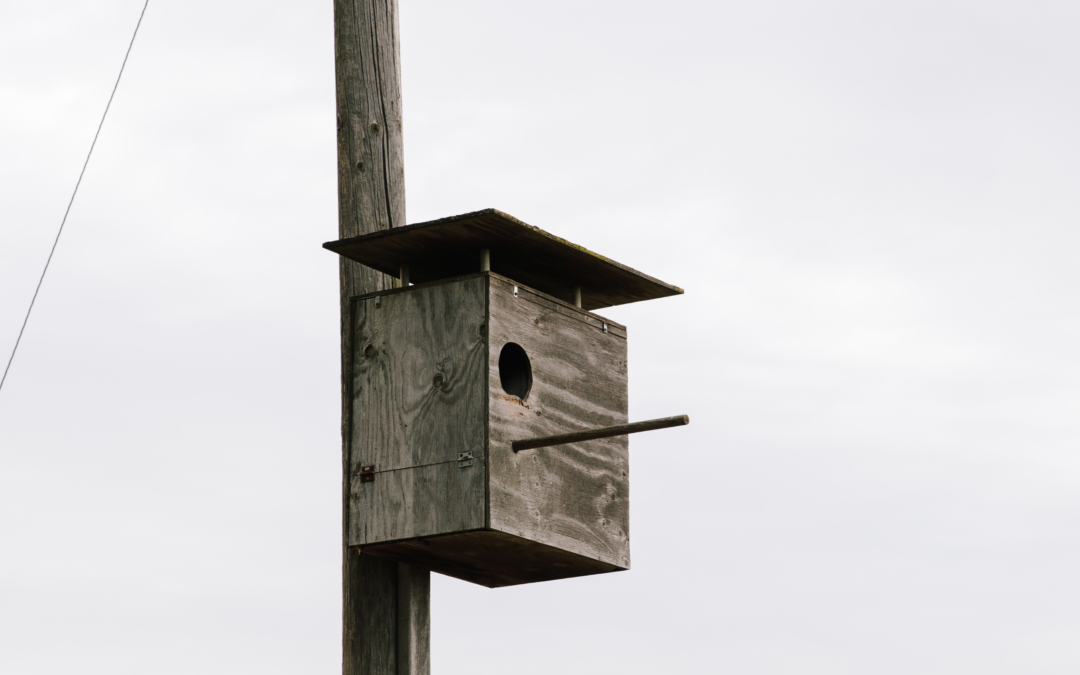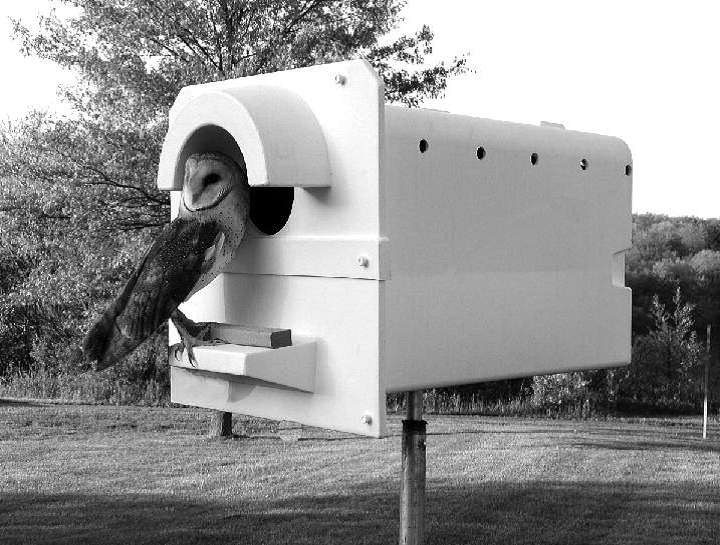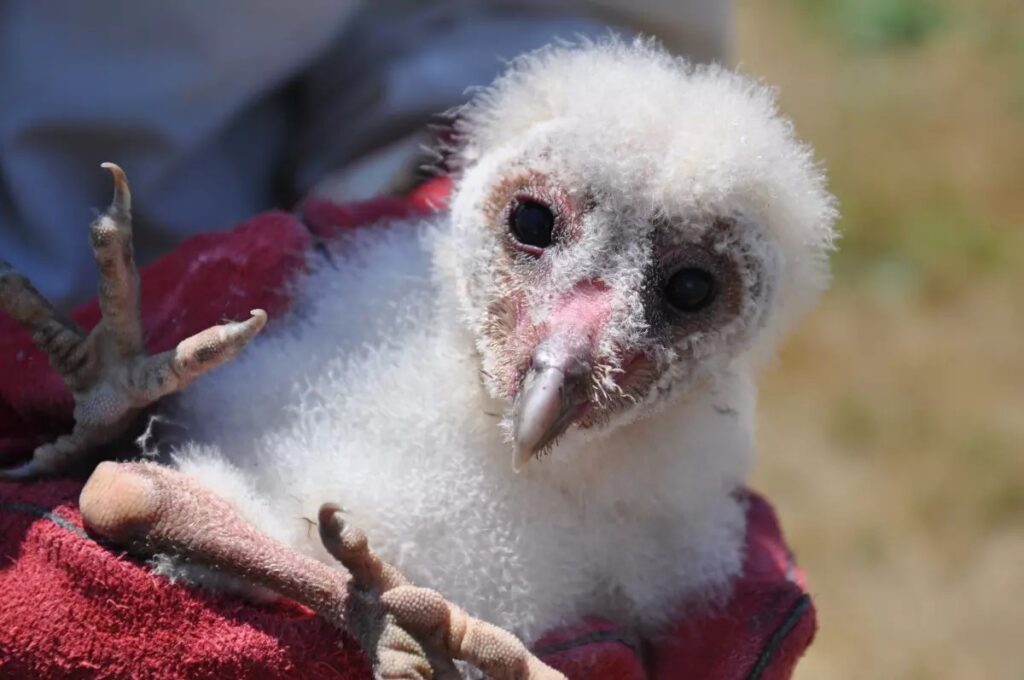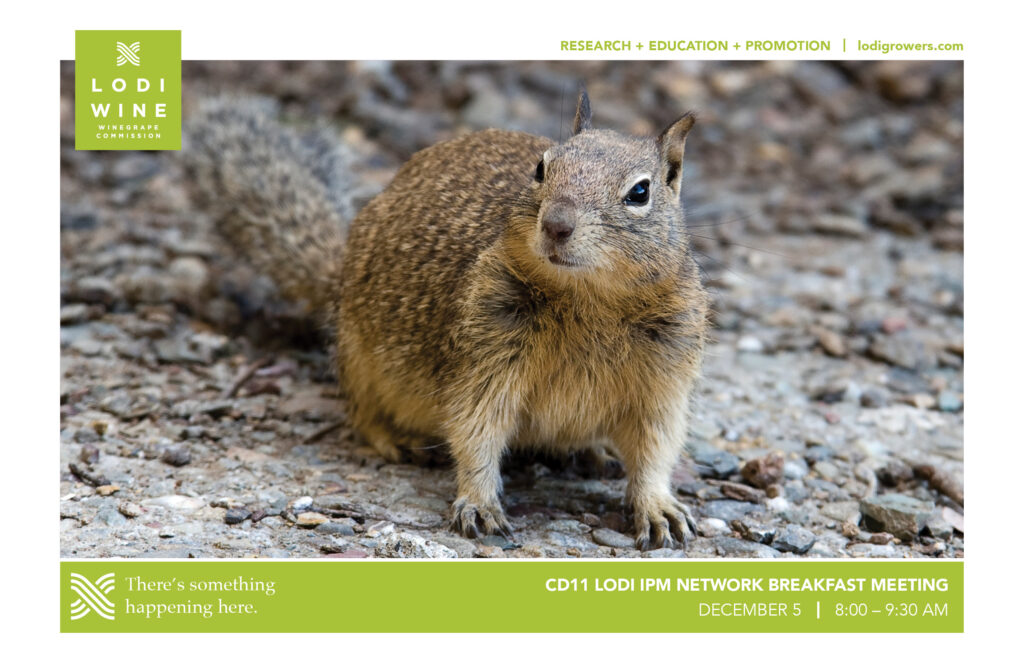MONDAY, NOVEMBER 27, 2023. BY LODI WINEGRAPE COMMISSION.
It is now time to clean out your barn owl nesting boxes, which depending on where you live are usually empty from the end of October to early December. Unfortunately, owls do not clean out their own nests, which are created from regurgitated pellets, so we need to help out by removing the nests and replacing them with pine, fir, or hardwood mulch. Make sure to avoid cedar and straw. Every year nests need to be cleared to keep owls safe and healthy and to ensure there is enough space for an owl family. A single owl family can create over three inches of nest debris in one year.
Signs of Occupation
Signs of an occupied barn owl box include:
- a dark ring and scratches around the entry hole
- pellet debris hanging from the drainage holes
- young owls hissing and clicking their teeth (often described as a metallic clicking sound)
- adult owls flying around the box, possibly shrieking, during the hour after sunset
The box can still be inhabited even if none of the above signs are present. To be cautious and respectful, use a pole with a camera or phone attached to record the presence or absence of owls. Gently banging on the mounting pole or post will disturb the owls. If an owl is in the box when it’s open, close the box and come back later.
Barn owl at Stone Lakes National Wildlife Refuge. Credit: Amy Hopperstad/USFWS.
How to Clean Out a Barn Owl Box
Using a ladder to reach an owl box is dangerous, so it is safer to bring the box down by lifting the mounting pole up over the stem pole and laying it down. Before opening the box door, it is best to wear goggles, an N95 mask, long rubber gloves, and a Tyvek suit. Then use a metal tool to scrape the debris out of the box. During cleaning, the box should be inspected for damage and appropriate repairs done.
NOTE: Although rare, cleaning the box can cause exposure to Hantavirus (Hantavirus Pulmonary Syndrome), carried by field mice. Once the debris is on the ground, it is harmless.
If you have any owl pellets, the WOW Museum is always accepting donations. Drop off your owl pellets at the WOW Museum in a ziploc bag Thursday through Monday between the hours of 10am to 5pm. They are located at 2 N Sacramento St, Lodi, CA 95240 and you can contact them by phone at 209.368.0969.
The Wild Farm Alliance has released new specs and plans for barn owl boxes. These plans are based on their research and experience with nesting barn owls on farms in California. If you are in need of installing owl boxes, below are two local companies that you can find in our online Grower and Vineyard Supplier Directory and can contact.
AMADOR BARN OWL BOX CO.
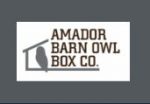
Description: We are an Amador County-based sustainable agriculture business founded to (1) provide local jobs and (2) to solve local agriculture problems. We have created the Amador Barn Owl Box to leverage the traditional Barn Owl for rodent control – nature’s way. The box is affordable and is:
– Designed specifically for the common Barn Owl (Tyto alba)
– Handmade out of wood by Amador County craftsmen
– Available for pole or structure mounting
– Ready to Mount. Location and installation assistance are available.
Bluebird boxes and bat houses are available too!
WATKINS OWL BOXES
Description: All boxes are custom-made with 3/4-inch plywood. The dimensions are 2ft wide by 2ft tall. 18 1/2 in deep. They are made with all exterior grade plywood and exterior glue and screws.
– They have a heat shield top that is slightly sloped for easy water runoff and can come with a heat shield back on request.
– A divider inside for nesting from the entrance.
– There is a clean-out hatch in the back of boxes with stainless steel hinges for easy clean-out.
– The owl boxes can come primed and painted upon request for an extra fee.
In the Fourth Edition of LODI RULES, one favorite practice is LR Standard 3.12 “Agrobiodiversity: Beneficial Species Habitat,” which empowers growers to support populations of birds, bats, snakes, and bees, plus their activities in and around vineyards, including predation of vineyard pests. LR Standard 3.12.1 “Habitat: Nesting Boxes for Raptors,” is specific to owls by providing them a box to nest.
Please join us for our monthly CD11 IPM Network Breakfast meeting, on Tuesday, December 5, 2023, where Roger Baldwin, PhD, with UC Cooperative Extension will talk about IPM strategies for ground squirrels and other rodents in the vineyard.
CD11 LODI IPM NETWORK BREAKFAST MEETING
Date: Tuesday, December 5, 2023
Time: 8:00 – 9:30am
Venue: Burgundy Hall, Grape Festival Grounds, 413 E Lockeford St, Lodi, CA
Cost: FREE, all are welcome & encouraged to attend
Credits: 1.5 hrs DPR CE (OTHER) approved
Special Guest & Topic: Roger Baldwin, PhD, UCCE – Ground Squirrels & Rodents
Who Should Attend: Local Pest Control Advisers (PCAs), GROWERS who manage their own pest control (PRIVATE APPLICATORS) or who have pest control questions, anyone looking for viticulture DPR CE credits, viticulture TECHNICAL ADVISORS in Lodi, and winemakers/grower relations personnel interested in learning about vineyard pest management.
Description: Our group meets monthly to discuss current vineyard pests and their management. The goal is to create a strong local network for communicating the best IPM strategies and for support in solving viticultural anomalies. This month Roger Baldwin, PhD, with the UC Cooperative Extension will talk about IPM strategies for ground squirrels and other rodents in the vineyard.
RSVP: To the Lodi Winegrape Commission by phone 209.367.4727 or email info@lodiwine.com.
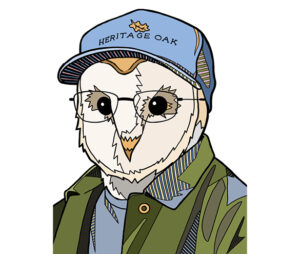
To learn more about owls and LODI RULES, click HERE to read the legend of owl box Tom.
This blog post was updated by Gabriella Goode from a previous Coffee Shop Blog posted on November 2, 2017. Thanks to Austin Ford, Jr. (Amador Barn Owl Box Co.) and Kendra Altnow (LangeTwins) for contributing information.
Have something interesting to say? Consider writing a guest blog article!
To subscribe to the Coffee Shop Blog, send an email to stephanie@lodiwine.com with the subject “blog subscribe.”
To join the Lodi Growers email list, send an email to stephanie@lodiwine.com with the subject “grower email subscribe.”
To receive Lodi Grower news and event promotions by mail, send your contact information to stephanie@lodiwine.com or call 209.367.4727.
For more information on the wines of Lodi, visit the Lodi Winegrape Commission’s consumer website, lodiwine.com.
For more information on the LODI RULES Sustainable Winegrowing Program, visit lodigrowers.com/standards or lodirules.org.

